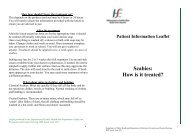national guidelines on the management of outbreaks of norovirus ...
national guidelines on the management of outbreaks of norovirus ...
national guidelines on the management of outbreaks of norovirus ...
Create successful ePaper yourself
Turn your PDF publications into a flip-book with our unique Google optimized e-Paper software.
Nati<strong>on</strong>al Guidelines <strong>on</strong> <strong>the</strong> Management <strong>of</strong> Outbreaks <strong>of</strong> Norovirus Infecti<strong>on</strong> in Healthcare Settings NDSC<br />
quantify <strong>the</strong> extent <strong>of</strong> <strong>the</strong> outbreak. This should be d<strong>on</strong>e by means <strong>of</strong> a properly c<strong>on</strong>structed questi<strong>on</strong>naire.<br />
The outbreak should be described in terms <strong>of</strong> time, place and pers<strong>on</strong> to ensure that its full extent is<br />
recognised. Epidemiological assistance may be required for this.<br />
• Envir<strong>on</strong>mental health investigati<strong>on</strong>: to ensure food safety is protected and <strong>the</strong> kitchen/ food and food<br />
workers are not ei<strong>the</strong>r at risk <strong>of</strong> c<strong>on</strong>taminati<strong>on</strong> or a source <strong>of</strong> c<strong>on</strong>taminati<strong>on</strong> and hence prevent fur<strong>the</strong>r<br />
cases. If a point source is suspected, epidemiological and envir<strong>on</strong>mental investigati<strong>on</strong>s should be<br />
undertaken to identify or exclude a c<strong>on</strong>taminated food or water source.<br />
• Microbiological investigati<strong>on</strong>: to identify definitively and document <strong>the</strong> causative pathogen.<br />
• Analytical studies: more complex analytical studies may be necessary to determine possible exposures<br />
and methods <strong>of</strong> transmissi<strong>on</strong>.<br />
• Declarati<strong>on</strong> that <strong>the</strong> outbreak is over.<br />
• Producti<strong>on</strong> <strong>of</strong> a final report.<br />
3.3 Identificati<strong>on</strong> <strong>of</strong> an Outbreak <strong>of</strong> Norovirus<br />
The first pers<strong>on</strong> that becomes aware <strong>of</strong> or suspects an outbreak, should<br />
inform a known member <strong>of</strong> Infecti<strong>on</strong> C<strong>on</strong>trol staff in <strong>the</strong>ir area. In each<br />
hospital or residential home, a lead pers<strong>on</strong> should be designated to manage<br />
<strong>the</strong> outbreak. In hospitals <strong>the</strong> preliminary investigati<strong>on</strong> should be led by <strong>the</strong><br />
C<strong>on</strong>sultant Microbiologist and/ or Infecti<strong>on</strong> C<strong>on</strong>trol Nurse and/or designated<br />
clinician. Senior <strong>management</strong> in all hospitals should be resp<strong>on</strong>sible for<br />
producing outbreak plans.<br />
The designated lead pers<strong>on</strong> should:<br />
• Decide whe<strong>the</strong>r or not <strong>the</strong> cases are likely to have <strong>the</strong> same illness and establish a tentative diagnosis.<br />
• Decide <strong>on</strong> whe<strong>the</strong>r to c<strong>on</strong>vene an Outbreak C<strong>on</strong>trol Team.<br />
• If <strong>norovirus</strong> is suspected, ensure that c<strong>on</strong>trol measures are put in place immediately.<br />
• Report <strong>the</strong> suspected outbreak at an early stage to senior hospital <strong>management</strong> and to <strong>the</strong> regi<strong>on</strong>al<br />
Director <strong>of</strong> Public Health.<br />
• Form a preliminary hypo<strong>the</strong>sis as to <strong>the</strong> cause.<br />
Infecti<strong>on</strong> due to <strong>norovirus</strong> can usually be diagnosed <strong>on</strong> <strong>the</strong> basis <strong>of</strong> typical clinical and outbreak<br />
characteristics. Characteristic clinical features with sudden <strong>on</strong>set <strong>of</strong> projectile vomiting and simultaneous<br />
involvement <strong>of</strong> patients and staff is highly suggestive <strong>of</strong> an outbreak <strong>of</strong> illness due to <strong>norovirus</strong>.<br />
Gastrointestinal symptoms are very comm<strong>on</strong> in healthcare settings especially am<strong>on</strong>g <strong>the</strong> elderly and children.<br />
A clinical case definiti<strong>on</strong> for gastroenteritis has been proposed to identify possible cases <strong>of</strong> gastroenteritis. 12<br />
This includes:<br />
• Three or more loose stools in 24 hours<br />
and/ or<br />
• Vomiting three or more times in 24 hours<br />
and/ or<br />
• Loose stools or vomiting with two<br />
additi<strong>on</strong>al symptoms, such as nausea,<br />
fever, abdominal pain, abdominal cramps,<br />
and blood or mucus in stool.<br />
Once a patient is suspected <strong>of</strong> having symptoms <strong>of</strong> gastroenteritis, a decisi<strong>on</strong> must be made as to whe<strong>the</strong>r<br />
<strong>the</strong> symptoms could be due to <strong>norovirus</strong>.<br />
- Page 6 -<br />
Key Message<br />
An early, rapid resp<strong>on</strong>se<br />
to an outbreak due to<br />
<strong>norovirus</strong> within hospitals<br />
and o<strong>the</strong>r healthcare<br />
settings is <strong>the</strong> key to its<br />
c<strong>on</strong>trol<br />
Box 1 –Criteria for suspecting an outbreak is due<br />
to <strong>norovirus</strong> (amended from Kaplan et al. 1982) 13<br />
• Vomiting (<strong>of</strong>ten projectile) in ≥ 50% <strong>of</strong> cases<br />
• Durati<strong>on</strong> <strong>of</strong> illness 12–60 h<br />
• Incubati<strong>on</strong> period <strong>of</strong> 15–48 h<br />
• Staff and patients affected<br />
• Stools negative for bacteria (including C. difficile)<br />
and o<strong>the</strong>r viruses






